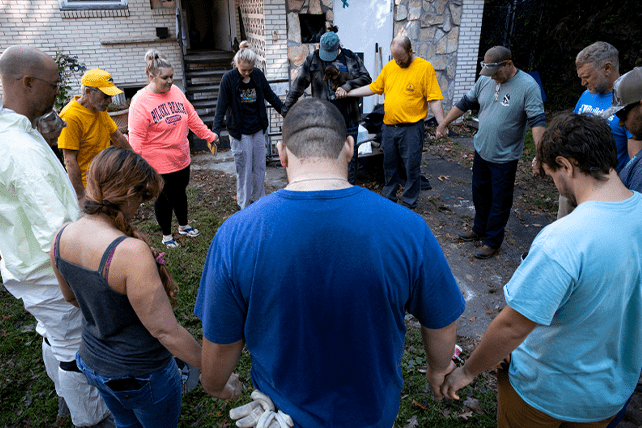(RNS) — In late January, North Carolina Governor Josh Stein announced $30 million in grants to fund his state’s recovery from Hurricane Helene.
Included in that total was $6 million for two faith-based groups helping rebuild homes after the storm: $3 million for Habitat for Humanity, a housing nonprofit based on Christian principles; and $3 million for Baptists on Mission, an auxiliary of the Baptist State Convention of North Carolina.
The Baptists plan to use their $3 million to buy building supplies to repair as many as 1,000 homes in the coming year, said Richard Brunson, executive director of Baptists on Mission.
Brunson told Religion News Service that accepting the grants made sense. “More than half the cost of building is labor, but with volunteers providing the labor we can double or even triple the number of families that we can get back in their homes,” Brunson said in accepting the grant. He also thanked Stein for a previous state grant of $5 million for disaster relief.
But the Baptists’ decision to accept the grant comes as faith-based groups such as Church World Service, Lutheran Services in America, Catholic Charities and World Relief have been under fire for accepting federal funds for helping immigrants and refugees. President Donald Trump’s political allies have called the grants “money laundering” and “illegal,” while some of the president’s religious allies accuse charities of selling their faith out to liberals.
The Center for Baptist Leadership, run by former Trump administration staffer William Wolfe, claimed that a ministry center run by Send Relief, a Southern Baptist ministry, violated the denomination’s official statement of faith by accepting government funds in a partnership with World Relief to assist refugees.
“The fact that Send Relief took federal grant funding from the Biden State Department, laundered through World Relief, is shocking,” the Center for Baptist Leadership claimed.
To back the claim, the center pointed to a section of the Baptist Faith & Message that opposed any taxes that would benefit churches — a reference to long-held Baptist opposition to state churches. “The church should not resort to the civil power to carry on its work,” the Baptist Faith & Message states. “The gospel of Christ contemplates spiritual means alone for the pursuit of its ends.”
The Trumpworld criticism is at odds with last week’s announcement that Paula White-Cain, a close adviser to Trump, would head the White House Faith Office, which promotes partnerships between faith groups and the government. The first such office began in the George W. Bush administration, which built on federal legislation called Charitable Choice that began to loosen restrictions on government grants to faith groups in the 1900s.
Trump’s recent executive order establishing the faith office said faith groups should be able “to compete on a level playing field for grants, contracts, programs, and other Federal funding opportunities.”
Texas pastor Bart Barber, an expert on SBC polity, said Baptists have long opposed direct government funding of churches. Early American Baptists Roger Williams and Isaac Backus clashed with government leaders over state funding to establish a church in New England, while in Virginia, Baptist leader John Leland opposed a “general assessment bill” in the 1780s that would have taxed everyone and sent the money to the church of their choice.
“They thought it would make Baptists, Methodists, everybody happy,” said Barber. Instead, Baptists sank the bill.

